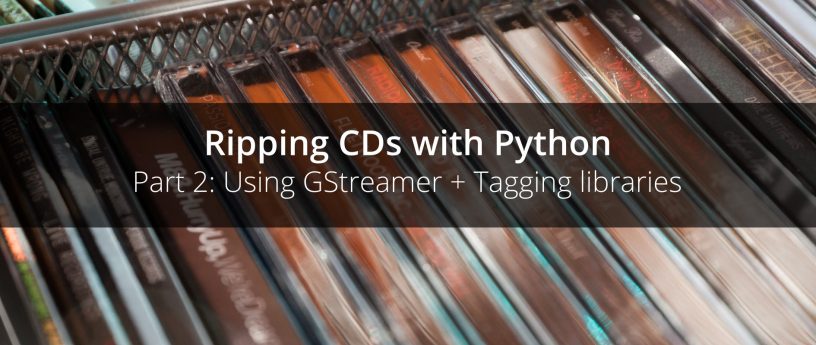In a previous article, you learned how to use the MusicBrainz service to provide tag information for your audio files, using a simple Python script. This article shows you how to also script an all-in-one solution to copy your CDs down to a music library folder in your choice of formats.
Unfortunately, the powers that be make it impossible for Fedora to carry the necessary bits to encode MP3 in official repos. So that part is left as an exercise for the reader. But if you use a cloud service such as Google Play to host your music, this script makes audio files you can upload easily.
The script will record your CD down to one of the following file formats:
- Uncompressed WAV, which you can further encode or play with.
- Compressed but lossless FLAC. Lossless files preserve all the fidelity of the original audio.
- Compressed, lossy Ogg Vorbis. Like MP3 and Apple’s AAC, Ogg Vorbis uses special algorithms and psychoacoustic properties to sound close to the original audio. However, Ogg Vorbis usually produces superior results to those other compressed formats at the same file sizes. You can read more about it here if you like technical details.
The components
The first element of the script is a GStreamer pipeline. GStreamer is a full featured multimedia framework included in Fedora. It comes installed by default in Workstation, too. GStreamer is used behind the scene by many multimedia apps in Fedora. It lets apps manipulate all kinds of video and audio files.
The second major component in this script is choosing, and using, a multimedia tagging library. In this case the mutagen library makes it easy to tag many kinds of multimedia files. The script in this article uses mutagen to tag Ogg Vorbis or FLAC files.
Finally, the script uses Python’s argparse, part of the standard library, for some easy to use options and help text. The argparse library is useful for most Python scripts where you expect the user to provide parameters. This article won’t cover this part of the script in great detail.
The script
You may recall the previous article that used MusicBrainz to fetch tag information. This script includes that code, with some tweaks to make it integrate better with the new functions. (You may find it easier to read this script if you copy and paste it into your favorite editor.)
#!/usr/bin/python3
import os, sys
import subprocess
from argparse import ArgumentParser
import libdiscid
import musicbrainzngs as mb
import requests
import json
from getpass import getpass
parser = ArgumentParser()
parser.add_argument('-f', '--flac', action='store_true', dest='flac',
default=False, help='Rip to FLAC format')
parser.add_argument('-w', '--wav', action='store_true', dest='wav',
default=False, help='Rip to WAV format')
parser.add_argument('-o', '--ogg', action='store_true', dest='ogg',
default=False, help='Rip to Ogg Vorbis format')
options = parser.parse_args()
# Set up output varieties
if options.wav + options.ogg + options.flac > 1:
raise parser.error("Only one of -f, -o, -w please")
if options.wav:
fmt = 'wav'
encoding = 'wavenc'
elif options.flac:
fmt = 'flac'
encoding = 'flacenc'
from mutagen.flac import FLAC as audiofile
elif options.ogg:
fmt = 'oga'
quality = 'quality=0.3'
encoding = 'vorbisenc {} ! oggmux'.format(quality)
from mutagen.oggvorbis import OggVorbis as audiofile
# Get MusicBrainz info
this_disc = libdiscid.read(libdiscid.default_device())
mb.set_useragent(app='get-contents', version='0.1')
mb.auth(u=input('Musicbrainz username: '), p=getpass())
release = mb.get_releases_by_discid(this_disc.id, includes=['artists',
'recordings'])
if release.get('disc'):
this_release=release['disc']['release-list'][0]
album = this_release['title']
artist = this_release['artist-credit'][0]['artist']['name']
year = this_release['date'].split('-')[0]
for medium in this_release['medium-list']:
for disc in medium['disc-list']:
if disc['id'] == this_disc.id:
tracks = medium['track-list']
break
# We assume here the disc was found. If you see this:
# NameError: name 'tracks' is not defined
# ...then the CD doesn't appear in MusicBrainz and can't be
# tagged. Use your MusicBrainz account to create a release for
# the CD and then try again.
# Get cover art to cover.jpg
if this_release['cover-art-archive']['artwork'] == 'true':
url = 'http://coverartarchive.org/release/' + this_release['id']
art = json.loads(requests.get(url, allow_redirects=True).content)
for image in art['images']:
if image['front'] == True:
cover = requests.get(image['image'], allow_redirects=True)
fname = '{0} - {1}.jpg'.format(artist, album)
print('Saved cover art as {}'.format(fname))
f = open(fname, 'wb')
f.write(cover.content)
f.close()
break
for trackn in range(len(tracks)):
track = tracks[trackn]['recording']['title']
# Output file name based on MusicBrainz values
outfname = '{:02} - {}.{}'.format(trackn+1, track, fmt).replace('/', '-')
print('Ripping track {}...'.format(outfname))
cmd = 'gst-launch-1.0 cdiocddasrc track={} ! '.format(trackn+1) + \
'audioconvert ! {} ! '.format(encoding) + \
'filesink location="{}"'.format(outfname)
msgs = subprocess.getoutput(cmd)
if not options.wav:
audio = audiofile(outfname)
print('Tagging track {}...'.format(outfname))
audio['TITLE'] = track
audio['TRACKNUMBER'] = str(trackn+1)
audio['ARTIST'] = artist
audio['ALBUM'] = album
audio['DATE'] = year
audio.save()
Determining output format
This part of the script lets the user decide how to format the output files:
parser = ArgumentParser()
parser.add_argument('-f', '--flac', action='store_true', dest='flac',
default=False, help='Rip to FLAC format')
parser.add_argument('-w', '--wav', action='store_true', dest='wav',
default=False, help='Rip to WAV format')
parser.add_argument('-o', '--ogg', action='store_true', dest='ogg',
default=False, help='Rip to Ogg Vorbis format')
options = parser.parse_args()
# Set up output varieties
if options.wav + options.ogg + options.flac > 1:
raise parser.error("Only one of -f, -o, -w please")
if options.wav:
fmt = 'wav'
encoding = 'wavenc'
elif options.flac:
fmt = 'flac'
encoding = 'flacenc'
from mutagen.flac import FLAC as audiofile
elif options.ogg:
fmt = 'oga'
quality = 'quality=0.3'
encoding = 'vorbisenc {} ! oggmux'.format(quality)
from mutagen.oggvorbis import OggVorbis as audiofile
The parser, built from the argparse library, gives you a built in –help function:
$ ipod-cd --help
usage: ipod-cd [-h] [-b BITRATE] [-w] [-o]
optional arguments:
-h, --help show this help message and exit
-b BITRATE, --bitrate BITRATE
Set a target bitrate
-w, --wav Rip to WAV format
-o, --ogg Rip to Ogg Vorbis format
The script allows the user to use -f, -w, or -o on the command line to choose a format. Since these are stored as True (a Python boolean value), they can also be treated as the integer value 1. If more than one is selected, the parser generates an error.
Otherwise, the script sets an appropriate encoding string to be used with GStreamer later in the script. Notice the Ogg Vorbis selection also includes a quality setting, which is then included in the encoding. Care to try your hand at an easy change? Try making a parser argument and additional formatting code so the user can select a quality value between -0.1 and 1.0.
Notice also that for each of the file formats that allows tagging (WAV does not), the script imports a different tagging class. This way the script can have simpler, less confusing tagging code later in the script. In this script, both Ogg Vorbis and FLAC are using classes from the mutagen library.
Getting CD info
The next section of the script attempts to load MusicBrainz info for the disc. You’ll find that audio files ripped with this script have data not included in the Python code here. This is because GStreamer is also capable of detecting CD-Text that’s included on some discs during the mastering and manufacturing process. Often, though, this data is in all capitals (like “TRACK TITLE”). MusicBrainz info is more compatible with modern apps and other platforms.
For more information on this section, refer to the previous article here on the Magazine. A few trivial changes appear here to make the script work better as a single process.
One item to note is this warning:
# We assume here the disc was found. If you see this: # NameError: name 'tracks' is not defined # ...then the CD doesn't appear in MusicBrainz and can't be # tagged. Use your MusicBrainz account to create a release for # the CD and then try again.
The script as shown doesn’t include a way to handle cases where CD information isn’t found. This is on purpose. If it happens, take a moment to help the community by entering CD information on MusicBrainz, using your login account.
Ripping and labeling tracks
The next section of the script actually does the work. It’s a simple loop that iterates through the track list found via MusicBrainz.
First, the script sets the output filename for the individual track based on the format the user selected:
for trackn in range(len(tracks)):
track = tracks[trackn]['recording']['title']
# Output file name based on MusicBrainz values
outfname = '{:02} - {}.{}'.format(trackn+1, track, fmt)
Then, the script calls a CLI GStreamer utility to perform the ripping and encoding process. That process turns each CD track into an audio file in your current directory:
print('Ripping track {}...'.format(outfname))
cmd = 'gst-launch-1.0 cdiocddasrc track={} ! '.format(trackn+1) + \
'audioconvert ! {} ! '.format(encoding) + \
'filesink location="{}"'.format(outfname)
msgs = subprocess.getoutput(cmd)
The complete GStreamer pipeline would look like this at a command line:
gst-launch-1.0 cdiocddasrc track=1 ! audioconvert ! vorbisenc quality=0.3 ! oggmux ! filesink location="01 - Track Name.oga"
GStreamer has Python libraries to let you use the framework in interesting ways directly without using subprocess. To keep this article less complex, the script calls the command line utility from Python to do the multimedia work.
Finally, the script labels the output file if it’s not a WAV file. Both Ogg Vorbis and FLAC use similar methods in their mutagen classes. That means this code can remain very simple:
if not options.wav:
audio = audiofile(outfname)
print('Tagging track {}...'.format(outfname))
audio['TITLE'] = track
audio['TRACKNUMBER'] = str(trackn+1)
audio['ARTIST'] = artist
audio['ALBUM'] = album
audio['DATE'] = year
audio.save()
If you decide to write code for another file format, you need to import the correct class earlier, and then perform the tagging correctly. You don’t have to use the mutagen class. For instance, you might choose to use eyed3 for tagging MP3 files. In that case, the tagging code might look like this:
... # In the parser handling for MP3 format from eyed3 import load as audiofile ... # In the handling for MP3 tags audio.tag.version = (2, 3, 0) audio.tag.artist = artist audio.tag.title = track audio.tag.album = album audio.tag.track_num = (trackn+1, len(tracks)) audio.tag.save()
(Note the encoding function is up to you to provide.)
Running the script
Here’s an example output of the script:
$ ipod-cd -o Ripping track 01 - Shout, Pt. 1.oga... Tagging track 01 - Shout, Pt. 1.oga... Ripping track 02 - Stars of New York.oga... Tagging track 02 - Stars of New York.oga... Ripping track 03 - Breezy.oga... Tagging track 03 - Breezy.oga... Ripping track 04 - Aeroplane.oga... Tagging track 04 - Aeroplane.oga... Ripping track 05 - Minor Is the Lonely Key.oga... Tagging track 05 - Minor Is the Lonely Key.oga... Ripping track 06 - You Can Come Round If You Want To.oga... Tagging track 06 - You Can Come Round If You Want To.oga... Ripping track 07 - I'm Gonna Haunt This Place.oga... Tagging track 07 - I'm Gonna Haunt This Place.oga... Ripping track 08 - Crash That Piano.oga... Tagging track 08 - Crash That Piano.oga... Ripping track 09 - Save Yourself.oga... Tagging track 09 - Save Yourself.oga... Ripping track 10 - Get on Home.oga... Tagging track 10 - Get on Home.oga...
Enjoy burning your old CDs into easily portable audio files!






Dave Sherratt
Should not the more modern compressed format, Ogg Opus, be offered as well as, or, dare I say, instead of, Ogg Vorbis here?
Paul W. Frields
@Dave: It could be. Again, I leave that as an exercise for the reader, since the purpose of the article is to encourage learning Python for DIY solutions like this.
Matěj Cepl
Couldn’t you make some git{lab,hub} repository with these scripts?
embolism
I dare say a good exercise for would be coders,but for those who are not into writing code and or just cannot be bothered i would recommend the Grip program made under open source I believe its in the repo so at command line “dnf install grip”,for those who just want to do it. : )
Adam Williamson
I’d instead recommend Whipper – https://github.com/JoeLametta/whipper – a fork of the now-unmaintained Morituri by Thomas Vander Stichele. Like EAC, AccurateRip etc. it aims for ‘accurate’ ripping, including handling drive offsets, checking the generated files against an online database, generating CUE sheets and dealing with things like pregaps properly. It’s also packaged for Fedora, so you can do ‘dnf install whipper’. Also it’s written in python, so you can see it as a much-enhanced version of these scripts 🙂 It doesn’t use gstreamer, though.
embolism
Whipper is relatively new to me despite being an old project as opposed Grip which has been about for about a decade now revived under johnny and maintained @sourceforge.net,it is a python clone of Grip if anything and uses Freedb and many of the same features although its options are less than more when taken into consideration Grip is better still at the moment for me and works out of the box on everything I
s,but Whipper is python and so will find favour for those that want accuracy over speed by using a 3rd party db for drive checking etc,s`all good when it works as with any program you use written in whatever code you use. (:^D)
Stuart D Gathman
MP3 file format patent has expired, and MP3 encoders are in Fedora now, and packages are slowly getting moved from rpmfusion to fedora. E.g. I just moved mp3fs to Fedora.
But MP3 has always been an inferior format, and the only reason to use it is for compatibility with devices (e.g. car stereos that reads MP3 CDs) that don’t support better formats. Note that many devices do support OGG and FLAC – e.g. the Sansa Clip (now discontinued) and successors.
Paul W. Frields
@Stuart: This is an excellent point. I didn’t realize the advanced state of having those things in Fedora. Once we have a gstreamer module for MP3 encoding, I can do a followup to to this article showing that solution. It’s still an excellent exercise for the reader!
Marcin
Looks nice, however there is also Asunder (which package I maintain in Fedora). It offers a GUI to rip CD, gather artists/titles and convert into various audio formats.
http://littlesvr.ca/asunder/